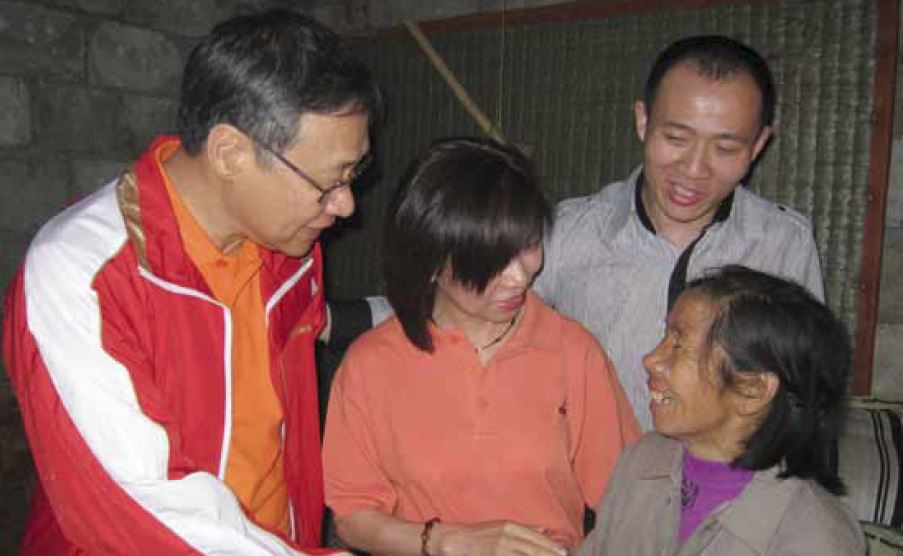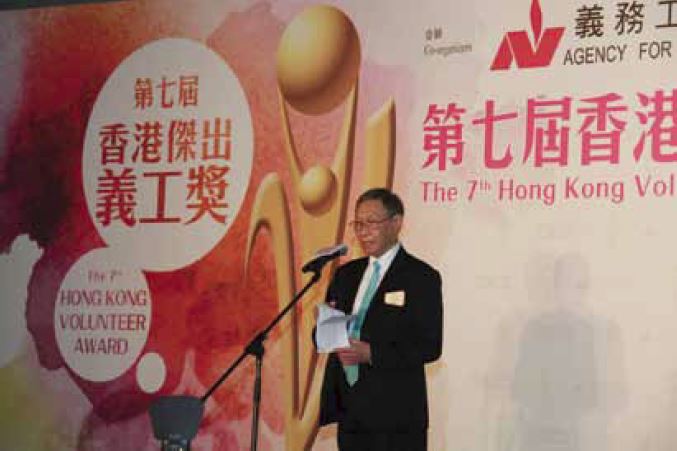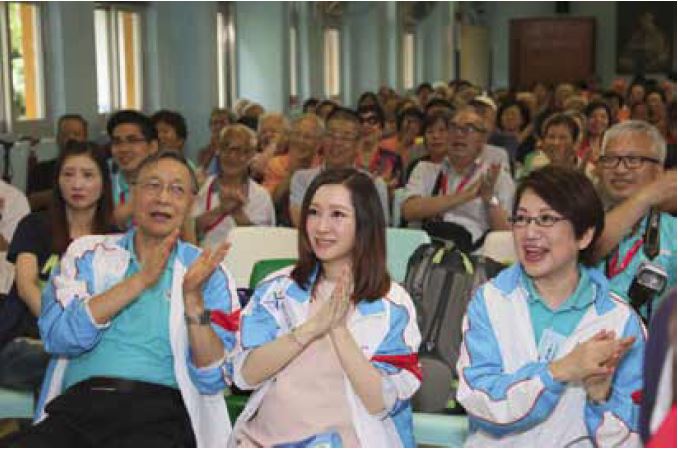© Hong Kong Academy of Medicine. CC BY-NC-ND 4.0
DOCTOR FOR SOCIETY
The untold tale behind volunteering: an interview with
Dr Chi-wang Shum
William Xue1; Brian PH Leung2
1 Year 3, The Chinese University of Hong
Kong
2 Year 6, The Chinese University of Hong
Kong
To most of us, volunteering is easy as long as we
have the time and strength to spare—we show up, follow the manual, then
break a sweat with our family and friends and fellow co-workers with a
smile. Although we are familiar with similar volunteering journeys of
frontline volunteers, few know about the individuals who mastermind
successful volunteer campaigns from the very beginning. Dr Chi-wang Shum,
the current Chairman of the Agency for Volunteer Service (AVS), tells us
in this featured article how the volunteering journey can be a completely
different story for an organiser.
The common goal
Dr Shum, who is a dental surgeon, also a father and
grandfather, has been altruistic since he was a student. He began
volunteering while pursuing his dentistry degree in the United Kingdom.
After graduating, he returned to Hong Kong in 1967 to work and take care
of his parents. Once settled in Hong Kong, the first thing Dr Shum did was
to find somewhere to volunteer. He saw this as providing some relief from
stressful work. Preferring to make the most out of his professional
skills, he started volunteering at the St John’s Ambulance, offering
dental services to fellow Hongkongers who lived on remote islands and the
mentally handicapped. He also participated in voluntary campaigns in
Mainland China alongside local dentists. After three decades of frontline
voluntary work, Dr Shum was invited in 1999 to join the Board of the AVS.
He held the post of Vice-Chairman from 2002 until 2017 when he became
Chairman.
Dr Shum gains huge satisfaction from volunteering,
where everyone strives for one common goal—the betterment of society. This
coincides with the Agency’s vision to “promote and develop sustainable
volunteerism for the building of a civil society and caring community”. He
stated that there are few conflicts of interest when people work for the
common good rather than for themselves, and he enjoys working in such a
peaceful work environment with a motivated and united team. “The same
applies to our society,” he added. “If people realised that we are all in
the same boat, there would definitely be less chaos.”
A change in role
Despite his long years of dedicated community
service, Dr Shum’s passion for volunteering has never wavered. At his peak
he devoted himself to volunteering on the frontline in most of his free
time. However, with work, family and other physical constraints, Dr Shum
can no longer afford such a degree of involvement. Since joining the AVS,
Dr Shum has discovered a new role in helping with its administration. Yet,
he realised that professional training and experience was required to
oversee the organisation’s administration. Hence, he has been continuously
acquiring various different skillsets, ranging from interpersonal and
management skills to knowledge about logistics and human resources. This
posed a huge challenge to him. After a lot of thought, he mustered the
courage to step out of his comfort zone. This eventually brought him to
another peak of his volunteering career.
The AVS provides an array of services and
programmes. Their volunteer referral service helps novices in volunteering
start by matching their skillset to services provided. Since 1998, the AVS
has also been working with Hong Kong Correctional Services that
distributes holiday greeting cards and educational materials made by the
inmates to non-governmental organisations and schools. The AVS also
partners with the United Nations Volunteers and every year students from
local universities have the chance of volunteering for 6 months in
South-East Asia under this programme. Although it is impossible for Dr
Shum to meet every single member of every party involved, he believes he
can learn something from those he meets.
“Being the organiser of an event is a lot different
to just participating in one.” Dr Shum stated while continuing to describe
hardships he had encountered. It has always been hard to raise funding, be
it government subsidies or public donations. “People are seldom convinced
that a voluntary agency like ours needs money to operate, saying that
volunteers should not ask for monetary rewards.” While it is true that the
Agency recruits volunteers for manpower, it still has operational costs if
it is to function and full-time staff require a salary. Dr Shum has seldom
acknowledged these challenges as an outsider, a mere participant. As the
Chairman of the AVS, Dr Shum not only attends the events but also helps
publicise them to potential sponsors and the general public. Dr Shum could
easily spend several days a week meeting sponsors and colleagues outside
of his daily dental practice. Only with such dedication can Dr Shum and
his colleagues help provide such a variety of services at the AVS.
Nonetheless there is a lot more to consider as an
organiser. Despite limited resources, Dr Shum and his colleagues have
never ceased to strive for improvement, even in minor respects. He quoted
the example of distributing festive packages to the elderly: common
practice would be to make the elderly queue up and wait, a method that
saves time and effort. A considerate organiser should, however,
acknowledge the risk that the elderly may trip over one another while
queuing, and experience physical discomfort from waiting for too long.
“Why not deliver the packages to their doorstep when you have the
manpower?” To Dr Shum, volunteering should not be an indulgence or a means
of satisfying the ego of the privileged and empowered. It should instead
be an opportunity to step into another’s shoes and be aware of their needs
and concerns.
Embracing diversity
Volunteering is not just one party helping another;
instead, it has always been mutually beneficial. One particular benefit
for Dr Shum is gaining a better understanding of our society through
identifying and addressing the needs of different stakeholders. He has
been constantly amazed and inspired by acts of his fellow volunteers,
especially those who help the underprivileged but who have often been
rejected by conventional volunteer agencies because of polarisation or
stigma. Such neglect and alienation is sadly still common in the city as
agencies have their own niche: some do not recognise or serve sexual
minorities because of their religious beliefs. Others choose not to work
with drug addicts because of concerns about hygiene and safety.
“Volunteers who overcome these misconceptions and prejudices to serve
minorities are worth our appreciation”, said Dr Shum.
In addition, the diversity lies also among the
volunteers themselves. Dr Shum is often blown away by how far some of his
fellow volunteers are willing to go, despite physical disabilities or lack
of resources. He is also astounded by the way people from different social
classes choose to be involved in voluntary work. An example he quoted was
the experience of retired company CEOs who, rather than directly fund the
organisation, choose instead to volunteer as tour guides under the
Volunteer Talent Bank of the AVS, taking the frail elderly people to
explore the city while recollecting their memories of Hong Kong’s history.
The list could go on and on.
In hopes of recognising such volunteers and
showcasing the diversity of volunteering, Dr Shum helped launch the
biennial Hong Kong Volunteer Award in 2005, where he and his fellow
committee members select and honour the most outstanding volunteers and
groups of the city and help spread their message. They aim to broaden the
public’s perspective of volunteering, and in turn encourage more people to
participate and even initiate acts of altruism. Running the award has
nonetheless been one of the most difficult tasks for him over the years of
volunteering, as he and his colleagues can pick only ten from a much
larger number of distinguished candidates. It has always been difficult
for them to leave someone out. Nonetheless the volunteers have never been
discouraged and every year they achieve more and more.
What’s next?
Dr Shum admits that he is getting older and is less
able to perform the intense field work so he is devoting more of his time
to working behind the scenes. Unlike a participant, the organiser does not
often come into direct contact with the beneficiary, receiving less direct
feedback from those who are helped. It took time for Dr Shum to learn to
embrace this, but he still enjoys frontline volunteer services by
attending volunteer events, such as charity runs, with his family. He not
only considers volunteering as his second career, but also as a way to
connect with his family and the next generation. Other than his work at
the AVS, Dr Shum is also a mentor to students at the University of Hong
Kong. He always looks forward to meeting his mentees as it acts as a great
means by which he can understand the opportunities and challenges of the
younger generation.
Considering how the current youth are so busy with
work, with little time to rest let alone volunteer, Dr Shum suggests they
start with small steps close to home. For example, they could start by
visiting the elderly people and homeless in the neighbourhood after work
and help distributing gifts to them. Although these are obviously the most
conventional forms of volunteering, we should not underestimate their
impact. They may be game-changing. The youth of today should take the
initiative and step out of their comfort zone. Dr Shum concluded by
saying, “The act of volunteerism may be frustrating at times, but if you
treat it as one of your other pastimes instead of gruelling labour, you
will find your shoulders lightened and gain immeasurable benefit.”

Dr Shum paying a visit to over 100 families in the hardest-hit disaster areas during the Rebuild Sichuan Volunteer Programme—Caring Trip to Sichuan

Dr Shum speaking at the 7th Hong Kong Volunteer Award Presentation Ceremony when he was Chairman of its organising committee

Dr Shum at the Volunteer Service for Elderly in celebration of Mother’s Day and Father’s Day as well as the Dragon Boat Festival organised by the Hong Kong Volunteer Awardees Society

